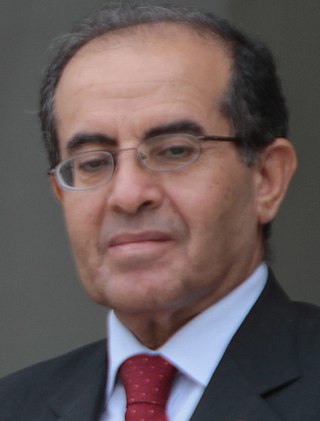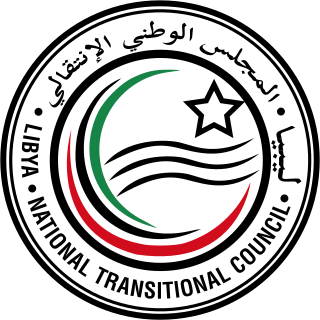Related Research Articles

The politics of Libya has been in an uncertain state since the collapse of the Libyan Arab Jamahiriya in 2011 and a recent civil war and various jihadists and tribal elements controlling parts of the country. On 10 March 2021,the interim Government of National Unity (GNU),unifying the Second Al-Thani Cabinet and the Government of National Accord was formed,only to face new opposition in Government of National Stability,until Libyan Political Dialogue Forum assured the ongoing ceasefire.

Mustafa Abdul Jalil is a Libyan politician who was the Chairman of the National Transitional Council from 5 March 2011 until its dissolution on 8 August 2012. This position meant he was de facto head of state during a transitional period after the fall of Muammar Gaddafi's government in the Libyan Civil War,and until the handover of power to the General National Congress.

Abdul Fatah Younis Al-Obeidi was a senior Libyan military officer. He held the rank of major general and the post of minister of interior,but resigned on 22 February 2011 and defected to the rebel side in the First Libyan Civil War. He was considered a key supporter of Muammar Gaddafi or even No. 2 in the Libyan government.

The Libyan Civil War began on 17 February 2011 as a civil protest and later evolved into a widespread uprising. By mid-August,anti-Gaddafi forces effectively supported by a NATO-led international coalition were ascendant in Tripolitania,breaking out of the restive Nafusa Mountains in the south to mount an offensive toward the coast and advancing from Misrata on loyalist-held cities and villages from the north and east.

The anti-Gaddafi forces,also known as the Libyan opposition or Libyan rebels,were Libyan groups that opposed and militarily defeated the government of Muammar Gaddafi during the First Libyan Civil War in 2011,killing him in the process. The Anti-Gaddafi forces were represented by the National Transitional Council and their National Liberation Army,which claimed to be the "only legitimate body representing the people of Libya and the Libyan state". These opposition forces included organized and armed militia groups,participants in the Libyan Civil War,Libyan diplomats who switched their allegiance from the Gaddafi-led government,and Libyan military units that switched sides to support the protesters.

The National Transitional Council (NTC) was a transitional government established in the 2011 Libyan civil war. The rebel forces overthrew the Libyan Arab Jamahiriya of Muammar Gaddafi. The NTC governed Libya for a period of ten months after the end of the war,holding elections to a General National Congress on 7 July 2012,and handing power to the newly elected assembly on 8 August.

The National Liberation Army,officially the National Liberation Armed Forces of the Free Libyan Republic,formerly known as the Free Libyan Army,was a Libyan military organisation affiliated with the National Transitional Council,which was constituted during the First Libyan Civil War by defected military members and civilian volunteers,in order to engage in battle against both remaining members of the Libyan Armed Forces and paramilitia loyal to the rule of Muammar Gaddafi. Its self proclaimed chief commander was General Khalifa Haftar,although the National Transitional Council preferred to appoint Major General Abdul Fatah Younes Al-Obeidi as its commander-in-chief. It had prepared for some time in portions of Eastern Libya controlled by the anti-Gaddafi forces for eventual full-on combat in Western Libya against pro-Gaddafi militants,training many men before beginning to go on the offensive. They have battled for control of Benghazi,Misrata,Brega,Ajdabiya,Zawiya and Ra's Lanuf as well as several towns in the Nafusa Mountains. They finally began the Battle for Tripoli in August 2011 when they attacked from the west of the city,as well as fomenting an internal uprising on 20 August.

Mahmoud Jibril el-Warfally,also transcribed Jabril or Jebril or Gebril,was a Libyan politician who served as the interim Prime Minister of Libya for seven and a half months during the overthrow of Muammar Gaddafi and the Libyan Civil War,chairing the executive board of the National Transitional Council (NTC) from 5 March to 23 October 2011. He also served as the Head of International Affairs. As of July 2012,Jibril was the head of one of the largest political parties in Libya,the National Forces Alliance.
Omar Mokhtar El-Hariri was a leading figure of the National Transitional Council of Libya who served as the Minister of Military Affairs in 2011,during the Libyan Civil War. He controlled the National Liberation Army and the Free Libyan Air Force from March to May 2011. He served on the council Executive Board before being replaced by Jalal al-Digheily,and he headed Military Affairs in the unicameral National Transitional Council legislature.

Ali Abdussalam Tarhouni is a Libyan economist and politician. Tarhouni served as the minister for oil and finance on the National Transitional Council,the provisional governing authority in Libya,from 23 March to 22 November 2011. He acted in the capacity of interim prime minister of Libya during the departure of outgoing incumbent Mahmoud Jibril from 23 October 2011 until Abdurrahim El-Keib was formally named to succeed Jibril on 31 October.
The Nafusa Mountains campaign was a series of battles in the Libyan Civil War,fought between loyalist pro-Gaddafi forces and rebel anti-Gaddafi forces in the Nafusa Mountains and,at a later period,in the surrounding plains of western Libya. The mountain range is of strategic importance due to its close proximity to the capital of Tripoli. Along with the city of Misrata,the Nafusa Mountains region was one of the major rebel strongholds in Tripolitania.

International recognition of the National Transitional Council of Libya was given by the majority of international states but was not universal.

The timeline of the Libyan civil war begins on 15 February 2011 and ends on 20 October 2011. The conflict began with a series of peaceful protests,similar to others of the Arab Spring,later becoming a full-scale civil war between the forces loyal to Muammar Gaddafi's government and the anti-Gaddafi forces. The conflict can roughly be divided into two periods before and after external military intervention authorized by United Nations Security Council Resolution 1973.

The Tripoli Revolutionaries Brigade or Free Tripoli Guardian was a unit of the National Liberation Army of Libya created during the Libyan Civil War that merged into the Tripoli Protection Force. Originally formed in April 2011 in the opposition stronghold of Benghazi,it later relocated to the Nafusa Mountains,then the closest frontline to Tripoli,before advancing into the city itself in August.

The Libyan Civil War began on 15 February 2011 as a civil protest and later evolved into a widespread uprising. However,by 19 March,Libyan forces under Colonel Muammar Gaddafi were on the brink of a decisive victory over rebels in Libya's east. That day,leading NATO members acted on United Nations Security Council Resolution 1973 which authorized member states "to take all necessary measures... to protect civilians and civilian populated areas under threat of attack in the Libyan Arab Jamahiriya,including Benghazi,while excluding an occupation force".

The 2011 Libyan Civil War began on 17 February 2011 as a civil protest and later evolved into a widespread uprising. After a military intervention led by France,the United Kingdom,and the United States on 19 March turned the tide of the conflict at the Second Battle of Benghazi,anti-Gaddafi forces regrouped and established control over Misrata and most of the Nafusa Mountains in Tripolitania and much of the eastern region of Cyrenaica. In mid-May,they finally broke an extended siege of Misrata.

The aftermath of the 2011 Libyan civil war has been characterized by marked change in the social and political order of Libya after the overthrow and killing of Muammar Gaddafi in the civil war that was fought in Libya in 2011. The country has been subject to ongoing proliferation of weapons,Islamic insurgencies,sectarian violence,and lawlessness,with spillovers affecting neighboring countries including Mali.

The killing of Muammar Gaddafi took place on 20 October 2011 after the Battle of Sirte. Muammar Gaddafi,the deposed leader of Libya,was captured by NTC forces and executed shortly afterwards.
Abdulrahman Ben Yezza is a Libyan businessman and politician who is the Oil Minister in the government of Abdurrahim El-Keib. Prior to the 2011 Libyan Civil War,Ben Yezza served as "chairman of the operator's management committee" for Italian oil company Eni. He also worked for Libya's National Oil Corporation during Libya's governance by Muammar Gaddafi,but he quit the company voluntarily due to reported differences with its then-leader Shokri Ghanem,a member of Gaddafi's inner circle. In 2014 the Libyan government has named Abdulrahman Ben Yezza as chairman of the Libyan Investment Authority (LIA). He temporarily replaced AmbdulMagid Breish who had to step out pending investigation into his role in the Gaddafi administration.

The Minister of Defence of Libya is the politically appointed head of the Libyan ministry of defence and is responsible for the Libyan Armed Forces.
References
- 1 2 3 "Libya: The colonel feels the squeeze". The Economist. 19 May 2011. Retrieved 6 August 2011.
- 1 2 Hill, Evan (28 July 2011). "General's death puts Libyan rebels in turmoil". Al Jazeera English. Retrieved 29 July 2011.
- 1 2 Flood, Derek Henry (25 July 2011). "Special Commentary from Inside Western Libya-- On the Precipice: Libya's Amazigh in Revolt". The Jamestown Foundation. Retrieved 6 August 2011.
- 1 2 Flood, Derek Henry (3 August 2011). "Special Commentary from Inside Western Libya-- The Nalut Offensive: A View from the Battlefield". The Jamestown Foundation. Retrieved 6 August 2011.
- 1 2 3 "Libyan rebel leader sacks executive branch of transitional council". Al Arabiya. 8 August 2011. Retrieved 9 August 2011.
- 1 2 "Jibril vows to quit after Libya 'liberation'". Al Jazeera English. 3 October 2011. Retrieved 3 October 2011.
- 1 2 "Local commander made Libya defense minister: NTC source". The West Australian. 22 November 2011. Retrieved 22 November 2011.
- ↑ "Hunt for "Fifth Column" Could be Beginning of End for Libya Rebels". The Jamestown Foundation. 4 August 2011. Retrieved 6 August 2011.
- ↑ "Armed forces chief holds talks". Gulf Times. 6 July 2011. Archived from the original on 23 September 2012. Retrieved 6 August 2011.
- ↑ "Major Libyan Rebel Group Seeks Shake-Up in Ranks". The New York Times. 4 August 2011. Retrieved 6 August 2011.
- ↑ Sandeep (4 August 2011). "Libya: dissension within the insurgency after the killing of Younis". Pisqa. Archived from the original on 25 March 2012. Retrieved 6 August 2011.